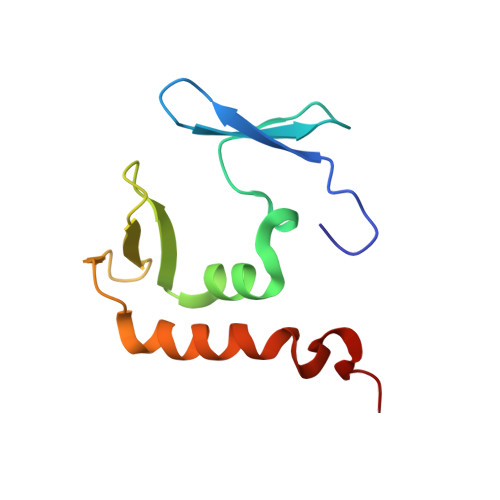Intramolecular autoinhibition regulates the selectivity of PRPF40A tandem WW domains for proline-rich motifs.
Martinez-Lumbreras, S., Trager, L.K., Mulorz, M.M., Payr, M., Dikaya, V., Hipp, C., Konig, J., Sattler, M.(2024) Nat Commun 15: 3888-3888
- PubMed: 38719828
- DOI: https://doi.org/10.1038/s41467-024-48004-x
- Primary Citation of Related Structures:
8PXW, 8PXX - PubMed Abstract:
PRPF40A plays an important role in the regulation of pre-mRNA splicing by mediating protein-protein interactions in the early steps of spliceosome assembly. By binding to proteins at the 5´ and 3´ splice sites, PRPF40A promotes spliceosome assembly by bridging the recognition of the splices. The PRPF40A WW domains are expected to recognize proline-rich sequences in SF1 and SF3A1 in the early spliceosome complexes E and A, respectively. Here, we combine NMR, SAXS and ITC to determine the structure of the PRPF40A tandem WW domains in solution and characterize the binding specificity and mechanism for proline-rich motifs recognition. Our structure of the PRPF40A WW tandem in complex with a high-affinity SF1 peptide reveals contributions of both WW domains, which also enables tryptophan sandwiching by two proline residues in the ligand. Unexpectedly, a proline-rich motif in the N-terminal region of PRPF40A mediates intramolecular interactions with the WW tandem. Using NMR, ITC, mutational analysis in vitro, and immunoprecipitation experiments in cells, we show that the intramolecular interaction acts as an autoinhibitory filter for proof-reading of high-affinity proline-rich motifs in bona fide PRPF40A binding partners. We propose that similar autoinhibitory mechanisms are present in most WW tandem-containing proteins to enhance binding selectivity and regulation of WW/proline-rich peptide interaction networks.
- Institute of Structural Biology, Molecular Targets and Therapeutics Center, Helmholtz Munich, Ingolstädter Landstrasse 1, 85764, Neuherberg, Germany. santiago.martinez@tum.de.
Organizational Affiliation:
















